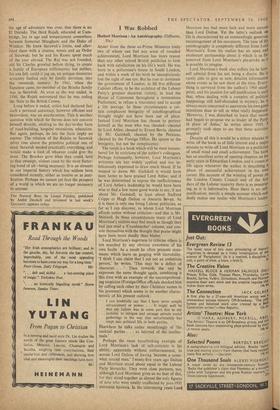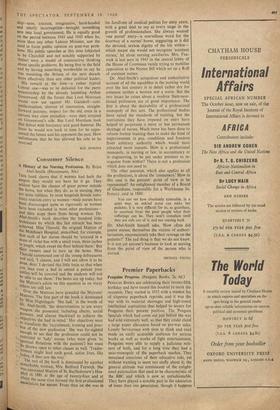I Was Robbed
APART from the three ex-Prime Ministers (only two of whom can feel any sense of rounded
achievement), Lord Morrison has more reason than any other retired British politician to look back with satisfaction on his life's work. He was born in a policeman's house in South London, and within a week of his birth he inauspiciously lost the sight of one eye. But he rose to dominate the government of London, to fill five different Cabinet offices, to be the architect of the Labour Party's greatest electoral victory, to lead the House of Commons throughout a momentous Parliament, to refuse a viscountcy and to accept a life peerage. In these circumstances a cer- tain complacent benignity of autobiographical thought might not have been out of place. Instead Lord Morrison has chosen to portray himself as the man who was cheated—cheated by Lord Attlee, cheated by Ernest Bevin, cheated by Mr. Gaitskell, cheated by the Persians, cheated by the Foreign Office. He spares us the benignity, but not the complacency.
The result is a book which will be most remem- bered for its criticisms of the author's colleagues. Perhaps fortunately, however, Lord Morrison's strictures are too widely applied and too in- felicitously expressed to draw much blood. If he wanted to damn Mr. Gaitskell it would have been better to have praised Lord Attlee; and if he was determined to expose the ineffectiveness of Lord Attlee's leadership he would have been wise to find a few more good words to say, if not about Mr. Gaitskell, at least about Stafford Cripps or Hugh Dalton or Aneurin Bevan. As it is there is only one living Labour politician, as far as I can discover, to whom Lord Morrison affords notice without criticism—and that is Mr. Shinwell. In these circumstances many of Lord Morrison's victims may feel much as though they had just read a 'Crossbencher' column, and con- sole themselves with the thought that praise might have been more deadly than blame.
Lord Morrison's eagerness to criticise others is not matched by any obvious awareness of his own faults. As a result he often presents state- ments which leave us gasping with incredulity. 'I think I can claim that I am not an ambitious person,' he writes. 'This may be a defect of character. . . .' Then towards the end he expresses the same thought again, combining it this time with an example of the uncomprehend- ing suspicion (Foreign Office officials shocked him by calling each other by their Christian names in his presence) which seems to be another charac- teristic of his present outlook :
I can truthfully say that I have never sought advancement or power. . . . It might well be that my failure was in some part due to my inability to intrigue and arrange private social gatherings in the way that unfortunately has crept into political life in both parties.
Elsewhere he talks rather mystifyingly of 'the cocktail parties . . . so beloved of the intellec- tuals.'
Perhaps the most breathtaking example of Lord Morrison's lack of self-criticism is his ability, apparently without embarrassment, to accuse Lord Dalton of having `become a some- what soured man.' Twenty-five years ago Dalton and Morrison stood about equal in the Labour Party hierarchy. They were close partners, too, although Lord Morrison gives us no hint of this, for they stood together as almost the only figures of note who were totally unaffected by post-1931 extremist hysteria. In the intervening years Lord Morrison has had more luck and more success than Lord Dalton. Yet the latter's outlook on life is characterised by an outstandingly generous encouragement of his successors. The tone of his autobiography is completely different from Lord Morrison's. Even his malice has an open and exuberant partisanship about it which is as far i removed from Lord Morrison's pin-pricks as it is possible to imagine.
Lord Morrison's book also suffers (as he him' self admits) from his not being a diarist. He Is rarely able to give us new, detailed information about events as he saw them at the time. Every- thing is surveyed from the author's 1960 stand- point, and his passion for self-justification is such that, when dealing with a complex of political happenings still half-shrouded in mystery, he is always more concerned to asseverate his own good intentions than to tell us what really happened. `However, I was disturbed to learn that moves had begun to propose me as leader of the Party in place of Attlee,' he writes about 1945. I promptly took steps to see that these activities stopped.'
Despite all this it would be a minor mistake to write off the book as of little interest and a major mistake to write off Lord Morrison as a politician of small mind and small achievement. The book has an excellent series of opening chapters on his early years in Edwardian London, and it comes to life again whenever the author is describing a phase of successful achievement in his own career. His account of the winning of power on the London County Council and of the first days of the Labour majority there is as penetrat' ing as it is informative. Here there- is no self" justification; merely a simple account which slid' denly makes one realise why Morrison's leader
ship—sane, tolerant, imaginative, hard-headed and utterly incorruptible—brought something new into local government. He is equally good on the period between 1943 and 1945 when he, more than any other Labour Minister, saw the need to focus public opinion on post-war prob- lems. His public speeches at this time (objected to by Churchill and not notably supported by Attlee) were a model of constructive thinking about specific problems. By being first in the field and by having something worthwhile to say be was moulding the Britain of the next decade more effectively than any other political leader. His reward at the time—a rather typical Labour one—was to be defeated for the party treasurership by the already bumbling Arthur Greenwood. All the forces that Lord Morrison would now use against Mr. Gaitskell—anti- intellectualism, distrust of innovation, straight- forward jealousy, respect for the old, even in a curious way class prejudice—were then arrayed on Greenwood's side. But Lord Morrison took that defeat with buoyancy and good humour. He knew he would win back in time for he repre- sented the future and his opponent the past. How unfortunate that he has allowed his role to be reversed.
ROY JENKINS











































 Previous page
Previous page